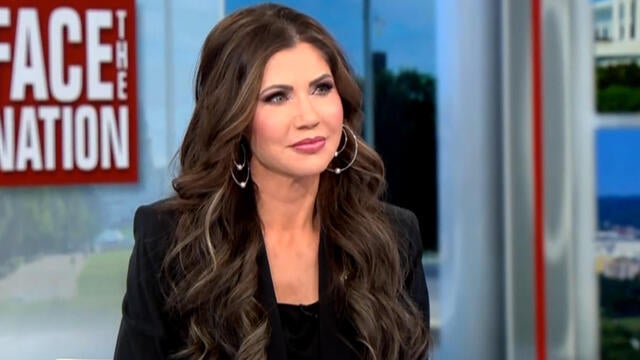CBS News has taken the unusual step of implementing a new policy for its flagship Sunday program Face the Nation following a storm of controversy surrounding an interview with Homeland Security Secretary Kristi Noem. The network announced that going forward, the program will broadcast only live or live-to-tape interviews, with exceptions only in cases involving national security or legal restrictions. The change, CBS explained, is meant to promote greater transparency and ensure that audiences see the full, unedited conversations that take place between moderators and their guests.

The announcement came after a week of backlash sparked by Noem’s complaints that her interview on the show had been unfairly edited. Noem claimed CBS “shamefully edited” her remarks about Kilmar Abrego Garcia, an undocumented immigrant charged with human smuggling, alleging that key parts of her warning about Garcia’s background were cut from the televised segment. In particular, she accused CBS of whitewashing what she described as Garcia’s history of violence, gang involvement, and predatory behavior.
Noem later posted video of her unaired response online, in which she described Garcia as a “known human smuggler, MS-13 gang member, an individual who’s a wife beater, and someone who was so perverted that he solicited nude photos from minors.” She added that even Garcia’s alleged accomplices had told him to stop because of how sickening his actions were. “He needs to never be in the United States of America, and our administration is making sure we’re doing all that we can to bring him to justice,” she said.
But critics quickly pointed out that many of Noem’s claims were unverified or unproven. Independent fact-checkers noted that while Garcia has been charged with two counts of human smuggling, he has pleaded not guilty and remains in ICE custody pending trial. He has not been charged with child abuse or solicitation of minors. PolitiFact and other outlets stressed that there is no evidence tying him to MS-13, nor are there public records supporting some of the other allegations raised by Noem. In other words, what CBS cut from the broadcast were claims that could not be substantiated.
Nevertheless, the optics of the edit caused problems for CBS. While the network did post the full transcript and unedited video of Noem’s interview online, including an editor’s note clarifying the legal facts of the case, viewers expressed frustration that the television broadcast excluded a portion of the conversation. CBS News responded by announcing the new policy designed to ensure that audiences will see full interviews as they happen, with moderators responsible for fact-checking in real time. This places added pressure on hosts like Ed O’Keefe, who conducted the Noem interview while filling in for regular moderator Margaret Brennan.

The timing of the policy change is significant. CBS parent company Paramount Global recently completed its merger with Skydance, a deal that was closely scrutinized by regulators and overshadowed by lawsuits involving the network’s handling of political interviews. Former President Donald Trump had sued the company over edits to a 2024 60 Minutes interview with Vice President Kamala Harris, alleging bias. Paramount eventually settled the lawsuit for $16 million, even though many legal experts considered it meritless. As part of that settlement, Paramount agreed to publish full transcripts of 60 Minutes interviews with U.S. presidential candidates after those segments air.
Skydance, seeking to ease regulatory approval of the merger, also committed to hiring an ombudsman to handle complaints about coverage. FCC Chairman Brendan Carr commented at the time that he would be “watching closely,” praising the promise to “address bias and restore fact-based reporting.” However, as the FCC itself points out, its authority over matters of editorial judgment, accuracy, and bias in news programming is limited. The result has been a heightened sense of political scrutiny on CBS and other networks whenever controversial edits surface.
Edits to taped interviews are, in fact, common practice across television news. Producers often trim conversations for time, clarity, or emphasis. Political figures, including Trump himself, have benefited from such edits. Earlier in 2024, Fox News cut part of Trump’s answer to a question about declassifying files related to Jeffrey Epstein. On Fox & Friends, his response aired as a simple “Yeah, I would,” while the full recording on Will Cain’s radio program revealed him hedging, saying, “Yeah, I would…I guess I would. I think that less so because, you don’t know, you don’t want to affect people’s lives if it’s phony stuff in there.” The discrepancy underscored how editorial decisions about trimming can reshape public perception.
For CBS, however, the stakes are higher because Face the Nation is one of the network’s most respected political programs, relied upon by millions of viewers for serious, fact-based discussions with policymakers. By shifting to a live or live-to-tape format, the network hopes to restore confidence, avoid accusations of bias, and deflect criticism that its producers selectively shape the narrative.

Still, the change poses challenges. Moderators will now bear the responsibility of confronting unverified claims on the spot, a difficult task in a live broadcast environment. Misinformation could air unchecked, forcing real-time corrections that risk creating confrontations with guests. Supporters argue this makes for more authentic journalism, while critics worry it could amplify falsehoods before fact-checks can be delivered.
Ultimately, the new policy represents an effort by CBS News to navigate a fraught media landscape in which trust in journalism is often under attack. By promising audiences the full conversation—unedited and untrimmed—the network is betting that transparency will outweigh the risks. Whether this gamble reassures viewers or simply creates new controversies remains to be seen, but one thing is certain: Face the Nation will never look quite the same again.
Leave a Reply